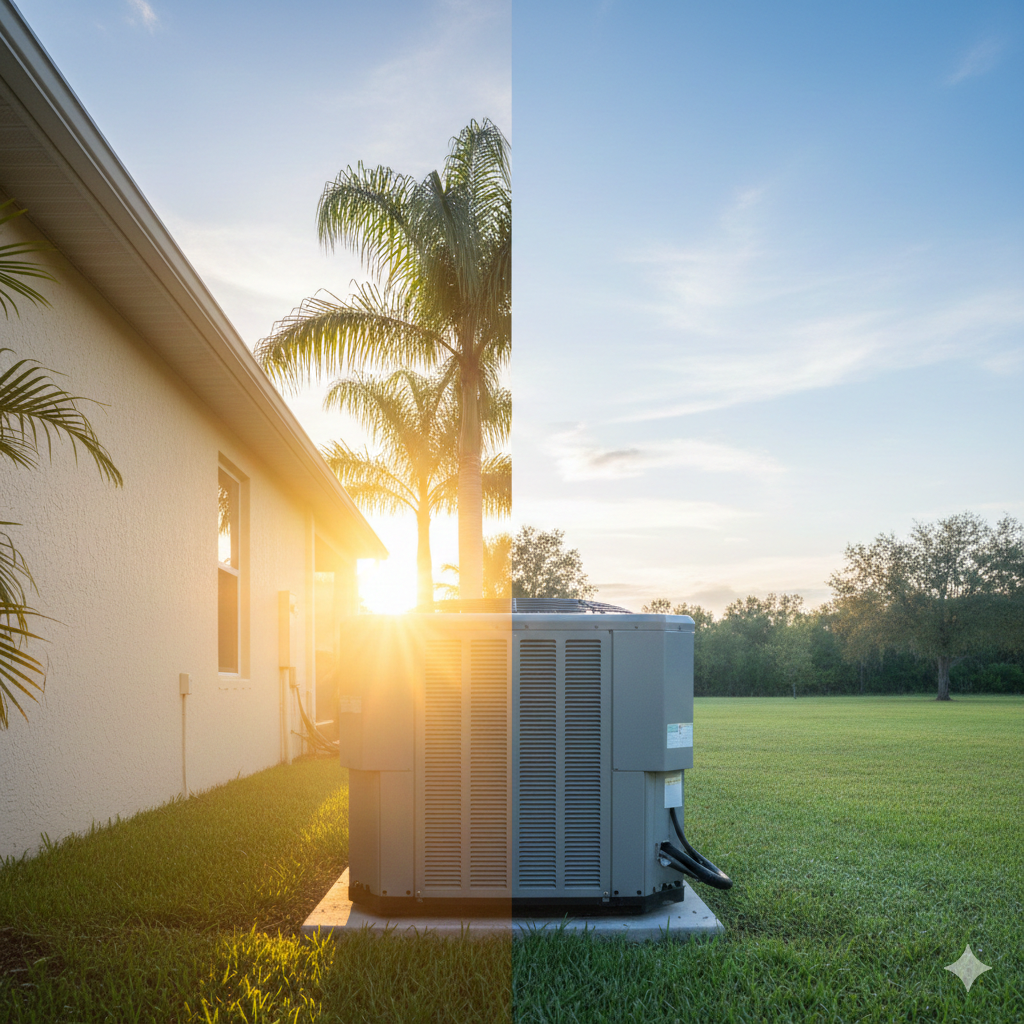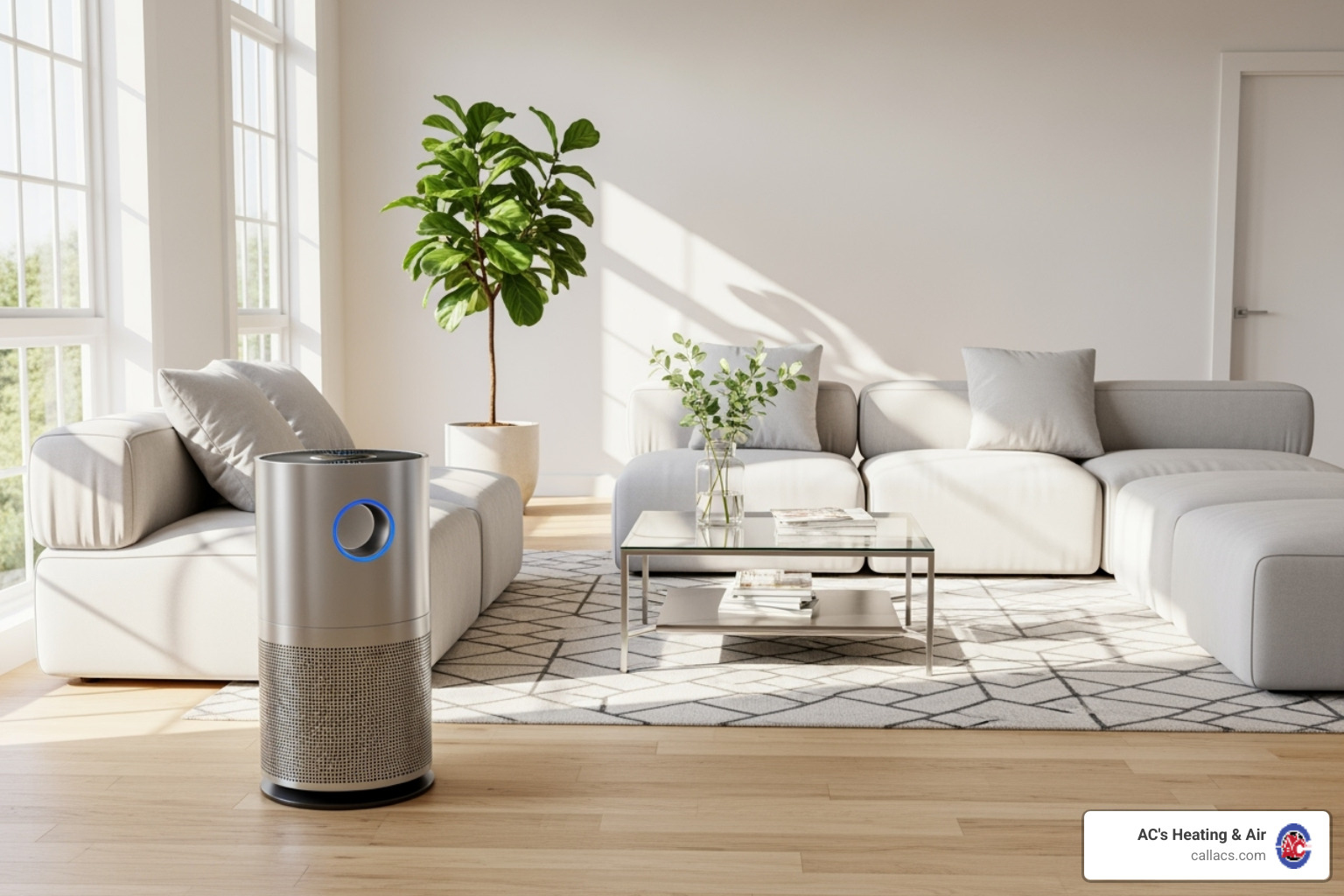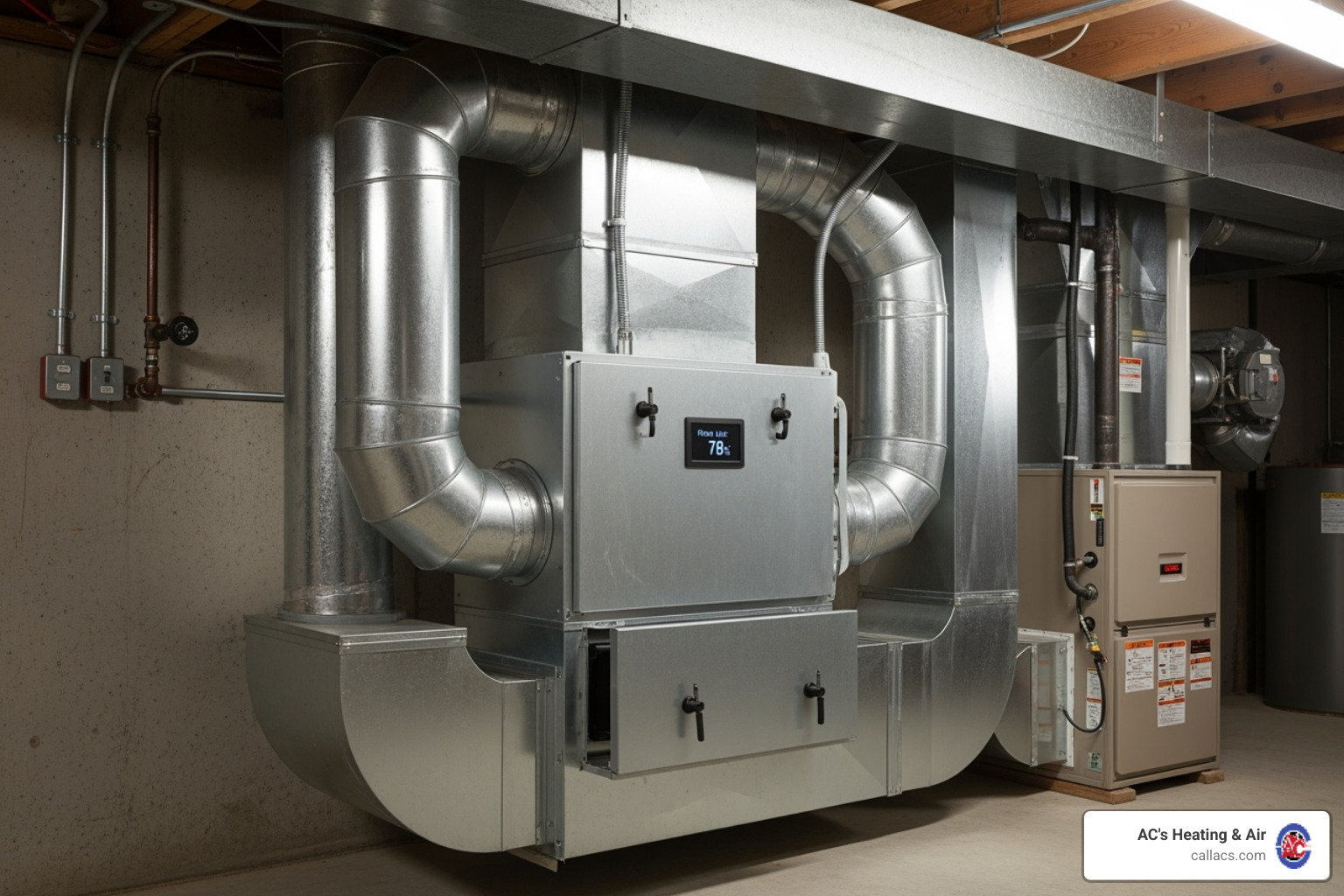Cooling Fins in a Bind: A Guide to AC Coil Damage

AC Coil Damage Explained: How to Fix Bent or Blocked Cooling Fins
Damaged coils on AC unit can significantly compromise the efficiency of your air conditioning system. Here's what you need to know quickly:
- Evaporator Coils: Responsible for cooling air, blocked or dirty coils result in poor dehumidification and can lead to frozen coils.
- Condenser Coils: Located in the outdoor unit, they disperse heat. If damaged, they can cause your AC to blow warm air.
- Signs of Damage: Unusual noises, warm air, or refrigerant leaks are clear indicators of issues.
Air conditioning systems are lifesavers in the Florida heat, with several crucial components, including coils, that work together to maintain a comfortable indoor environment. Understanding these components and their roles can help prevent unexpected breakdowns and ensure energy efficiency.
I'm Allen Chenault, your guide from AC's Heating & Air. With years of experience addressing damaged coils on AC unit, I am committed to helping you keep your home comfortable year-round. Let's explore how your AC system's health impacts your comfort.

Understanding AC Coils
When it comes to keeping your home cool, AC coils play a starring role. They might be tucked away inside your HVAC system, but they are crucial for efficient cooling. Let’s break down the two main types: evaporator coils and condenser coils.
Evaporator Coils
Think of the evaporator coil as the indoor component of your cooling system. Its job? To cool the air that circulates through your home. Here’s how it works:
- Cooling the Air: The evaporator coil absorbs heat from the indoor air. As warm air passes over the coil, the refrigerant inside absorbs the heat, turning from a liquid into a gas.
- Moisture Removal: This process also removes moisture from the air, helping to dehumidify your home. This is especially important in humid climates like Florida.
- Potential Problems: If these coils get dirty or blocked, they lose efficiency. This can lead to poor dehumidification and even frozen coils, which can stop your AC from working entirely.
Condenser Coils
Now, let’s head outside to the condenser coil. This coil releases the heat that the refrigerant absorbed from inside your home.
- Heat Dispersion: The refrigerant, now a hot gas, travels to the condenser coil. Here, it releases the heat it absorbed indoors, turning back into a liquid.
- Outdoor Unit: The condenser coil is part of the outdoor unit, which often includes a fan to help disperse the heat more effectively.
- Damage Risks: If the condenser coil gets damaged or dirty, it can’t release heat efficiently. This might cause your AC to blow warm air instead of cool.
Refrigerant Flow
Connecting these two coils is the refrigerant, the lifeblood of your AC system. It flows continuously between the evaporator and condenser coils, absorbing and releasing heat to keep your home at the perfect temperature.
- Cycle of Cooling: The refrigerant absorbs heat inside, then releases it outside. This cycle is what keeps your home cool and comfortable.
- Efficiency Matters: Proper refrigerant levels are crucial. Low refrigerant can cause your evaporator coils to freeze, while too much can strain your compressor.
Understanding how these components work together can help you spot issues early and keep your AC running smoothly. If you notice signs of damage like strange noises or refrigerant leaks, it's time to call a professional.

Stay tuned as we dive deeper into the signs of damaged coils on your AC unit and how you can spot them before they cause bigger problems.
Signs of Damaged Coils on AC Unit
Your AC unit is like a symphony of parts working together. When something goes wrong, the signs can be quite telling. Let's look at some common signs of damaged coils on an AC unit.
Strange Noises
One of the first signs you might notice is unusual sounds coming from your air conditioner. If you hear hissing or gurgling, it could mean refrigerant is escaping from a copper line. This is often due to a leak in the evaporator coil. Banging or clanking noises might indicate that the coil is loose and hitting other components. These sounds are a clear signal that it's time to call in a professional.
Warm Air
An air conditioner blowing warm air is a big red flag. The evaporator coil's job is to cool the air inside your home. If it's not functioning properly, the air won't be cooled effectively. This could be due to a frozen evaporator coil or a refrigerant leak. Either way, your AC won't be able to maintain the desired temperature, leaving you uncomfortable.
Refrigerant Leaks
Refrigerant is crucial for your AC to work efficiently. A leak can severely impact your system's performance. Signs of a refrigerant leak include reduced cooling effectiveness and a sweet, pungent smell. While older refrigerants like Freon have a distinct odor, newer ones like R-410A are odorless and non-toxic, making leaks harder to detect by smell alone. If you suspect a leak, call a professional immediately to prevent further damage.
Reduced Cooling Effectiveness
If your AC isn't cooling your home as it should, a damaged coil might be to blame. When the coils are dirty, blocked, or leaking refrigerant, their ability to absorb and release heat diminishes. This not only affects your comfort but also forces your system to work harder, leading to increased energy bills and potential wear and tear on other components.

Identifying these signs early can save you from costly repairs and ensure your home stays comfortable. If you notice any of these symptoms, it's time to get your AC checked by a professional.
Next, we'll explore the common causes of AC coil damage and how you can prevent them.
Common Causes of AC Coil Damage
Understanding what leads to damaged coils on an AC unit can help you prevent costly repairs and keep your system running smoothly. Let's explore some common causes:
Corrosion
Corrosion is a silent enemy of AC coils. Over time, moisture and pollutants in the air can react with the metal in the coils, leading to rust and corrosion. This is especially true in humid areas like Central Florida. Corrosion weakens the coils, making them more susceptible to cracks and leaks. Regular maintenance and using corrosion-resistant materials can help mitigate this issue.
Vibrations
Your air conditioner might seem sturdy, but it's sensitive to vibrations. These can occur due to loose parts or an unbalanced unit. Over time, vibrations can cause the coils to shift, leading to cracks or even breaking them. Ensuring your AC unit is properly installed and secured can reduce the risk of vibration damage.
Accidental Impacts
Accidents happen. Whether it's a stray ball from the backyard or a bump from lawn equipment, external impacts can damage the coils. The coils are delicate, and even a small dent can disrupt their function. To protect your unit, consider installing a protective barrier around it, but make sure it doesn't obstruct airflow.
Poor Filtration
A dirty or clogged air filter can be more than just a nuisance. Poor filtration allows dust and debris to accumulate on the coils, hindering their ability to absorb and release heat. This can lead to overheating and eventual coil damage. Regularly replacing your air filter is a simple yet effective way to keep your coils clean and functioning efficiently.
By understanding these common causes, you can take proactive steps to protect your AC unit. Next, we'll dig into the consequences of faulty AC coils and why addressing them promptly is crucial.
Consequences of Faulty AC Coils
When your AC coils are compromised, the consequences can be more than just uncomfortable—it can lead to serious issues for your entire air conditioning system.
Frozen Evaporator Coil
A frozen evaporator coil is often the first sign of trouble. This can happen if airflow is restricted due to dirt or if there's a refrigerant leak. Imagine trying to cool your home with an AC that's literally freezing up! The ice acts as an insulator, preventing the coil from absorbing heat. As a result, your AC struggles to cool your home, and you might find yourself shivering in the heat.
High Electricity Bills
Faulty AC coils can cause your system to work overtime. When the coils can't effectively transfer heat, the system must run longer to reach the desired temperature. This extra effort translates into higher energy consumption and, of course, higher electricity bills. If you notice a sudden spike in your energy costs, it might be time to inspect those coils.
Burnt-Out Compressor
The compressor is the heart of your AC system, and faulty coils can put it under immense stress. When coils are damaged, the refrigerant flow is disrupted, causing the compressor to work harder. Over time, this can lead to a burnt-out compressor, which is one of the most expensive repairs you can face. Preventative maintenance and timely repairs can save you from this costly consequence.
Increased Indoor Humidity
Another unpleasant effect of damaged coils is increased indoor humidity. When coils can't effectively remove heat, they also struggle to remove moisture from the air. This can make your home feel muggy and uncomfortable, even if the temperature is set correctly. High humidity can also lead to mold growth and damage to your home's interior, compounding the problem.
Addressing these consequences promptly is crucial to maintaining a comfortable home environment and avoiding expensive repairs. Let's explore whether repairing damaged coils is a feasible option.
Can You Repair Damaged AC Coils?
When faced with damaged coils on your AC unit, the first question is often whether they can be repaired. The answer depends on several factors, including the type of coil and the extent of the damage.
Copper Coils
Most AC systems use copper coils because copper is an excellent conductor of heat. However, even these durable coils can suffer from damage due to corrosion or physical impacts. Copper coils are generally easier to repair than those made from other materials. If the damage is minor, such as small leaks or surface corrosion, a skilled technician can often repair them effectively.
Professional Repair
Repairing AC coils is not a DIY task. It requires specialized knowledge and tools. Professional technicians can assess the damage and decide the best course of action. They have the expertise to handle refrigerants safely and ensure the repair is done correctly. Hiring a professional not only ensures your safety but also improves the chances of extending your AC system's life.
Efficiency Improvement
Repairing damaged coils can significantly improve your AC system's efficiency. When coils are in good condition, they facilitate proper refrigerant flow and heat transfer. This means your AC doesn't have to work as hard to cool your home, resulting in lower energy bills and a more comfortable indoor environment.
In some cases, if the damage is too extensive, replacing the coils might be the better option. A professional can help you weigh the costs and benefits of repair versus replacement.
Understanding the repair options available to you can help you make informed decisions about your AC system, ensuring it runs efficiently and reliably.
Next, we'll address some frequently asked questions about damaged coils on AC units.
Frequently Asked Questions about Damaged Coils on AC Unit
What happens when an AC coil goes bad?
When an AC coil goes bad, several problems can arise. One common issue is a frozen coil. This happens when the refrigerant inside the coil gets too cold due to restricted airflow or low refrigerant levels, causing ice to form. A frozen coil can stop your AC from cooling effectively, leaving your home feeling warm and uncomfortable.
Another consequence of bad coils is high electricity bills. Damaged coils force your AC system to work harder to maintain the desired temperature, leading to increased energy consumption. You might notice a sudden spike in your electricity bills if your coils are compromised.
In some cases, a bad coil can lead to a burnt-out compressor. The compressor is the heart of your AC system, and when it has to work overtime due to faulty coils, it can overheat and fail. This is a costly repair and can sometimes mean replacing the entire AC unit.
How much does it cost to replace AC coils?
Replacing AC coils can be a significant investment. The replacement cost depends on the type of coil and your specific AC unit model. While we can't provide specific pricing, consider the warranty on your AC system. If your system is still under warranty, it might cover part or all of the replacement costs. Always check your warranty details before proceeding with a replacement.
Can you repair damaged AC coils?
Yes, damaged AC coils can often be repaired, but it depends on the extent of the damage. Repair options include fixing small leaks or cleaning coils that are dirty but otherwise intact. Professional help is crucial here, as handling refrigerants and repairing coils require specialized skills and tools.
In cases where repair isn't feasible, a professional can help you decide whether to replace the coils or the entire unit. They can provide guidance based on the age and condition of your AC system, helping you make the most cost-effective decision.
Understanding these aspects can help you address coil issues promptly, ensuring your AC unit remains efficient and reliable.
Next, we'll dig into the Conclusion section, discussing how AC's Heating & Air can assist you with HVAC maintenance plans in Central Florida.
Conclusion
At AC's Heating & Air, we understand the importance of keeping your air conditioning system in top shape, especially in the warm climate of Central Florida. Our team is committed to providing exceptional HVAC services to ensure your home remains comfortable year-round.
Why Choose AC's Heating & Air?
We specialize in the installation, repair, and maintenance of heating and cooling systems. Our expert technicians are trained to handle a variety of HVAC issues, including damaged coils on AC units. With years of experience serving communities in Apopka, Winter Park, Orlando, and Winter Garden, we offer solutions custom to the unique needs of Central Florida residents.
HVAC Maintenance Plans
Regular maintenance is key to preventing costly breakdowns and ensuring your AC unit runs efficiently. Our HVAC maintenance plans are designed to keep your system in optimal condition. These plans include periodic inspections and tune-ups, helping to catch potential issues early and extend the lifespan of your equipment.
By choosing AC's Heating & Air, you can rest assured that your AC system is in good hands. Our commitment to quality service and customer satisfaction sets us apart in the HVAC industry.
For more information on how we can help maintain and repair your air conditioning system, contact AC's Heating & Air today. Let us help you keep your home cool and comfortable, no matter how hot it gets outside.



